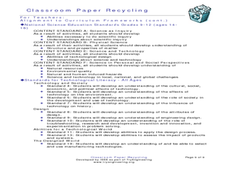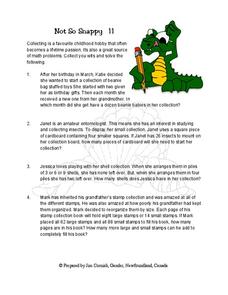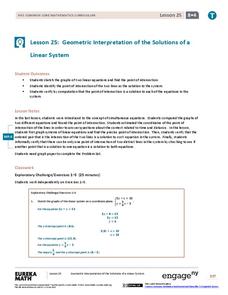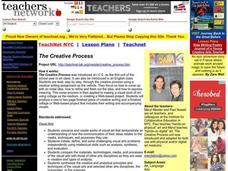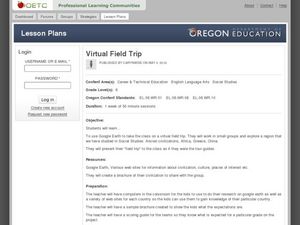Curated OER
Modeling: Having Kittens
Cats can't add, but they do multiply! Determine the number of descendants of a single cat given specific facts about cats and kittens. The lesson focuses on developing strategies for problem solving using both individual and group work....
Bonneville
Design and Engineer Solutions
What's the best way to collect all that trash? A culminating activity has scholars use the knowledge and skills from the unit to design a solution to the plastic trash island problem. They use 3-D pens or a 3-D printer to build models of...
Institute of Electrical and Electronics Engineers
Classroom Paper Recycling
After reading about the history and recycling of paper, creative crafters collaborate to think of a new process for making recycled paper. A complete teacher's guide and student worksheets are included. There is no written procedure for...
Curated OER
Rooster's Off To See the World Number-Sense
Students recognize how numbers are used in number stories. For this Rooster's Off To See the World lesson, students participate in the story. Students complete a number activity and work on the computer to illustrate a number story. ...
Illustrative Mathematics
The Stamp Collection
By using language like "half of the stamps," children are exposed to patterns in arithmetic that requires solving a two-step word problem. This type of language opens a new door for transitioning learners toward understanding fractions...
Curated OER
Roller Ball Race
Students use problem-solving skills and creativity to build a roller ball race track with adjustable ramp levels and changeable friction surfaces. They hypothesize how fast or slow balls will roll down ramps, varying the shape and size...
Denver Art Museum
Lesson: That's Not Natural
Any time kids engage in a design project, they are building problem-solving skills, collaborative learning skills, and creative thinking skills. Upper graders take a nature walk to observe and sketch organic shapes and lines that they...
Middle Tennessee State University
Who's Afraid of the Big Bad Wolf? A Comparison in American Culture
As part of their study of the Progressive Era, class groups examine a 20th century version of "The Three Little Pigs" through a New Era lens and identify how ideals such as the value of hard work, creativity, and problem solving, etc.,...
EngageNY
From Ratio Tables to Double Number Line Diagrams
How much sugar is in one bottle? Pupils use double number line diagrams to determine the amount of sugar in a 1L bottle of cola. The teacher leads a discussion on ways that double number lines can be of assistance in solving a problem...
Curated OER
Ticky Plans His Trip to Antarctica to See Tacky
First graders participate in creative problem solving activity to get from Utah to the Atlantic Ocean.
Illustrative Mathematics
Voting for Two, Variation 4
After elections, the total amount of votes is not specified but the ratio of votes is. Your learners' job is to determine the fraction of votes John received above half of all votes. The problem can be solved abstractly or by other...
Curated OER
Not So Snappy 11
In this word problem worksheet, students discover a creative way to practice math word problems - through childhood hobbies. With four word problems each ranging from collecting beanie bags, insects, shells, and stamps any student can...
EngageNY
Using Permutations and Combinations to Compute Probabilities
Now that we know about permutations and combinations, we can finally solve probability problems. The fourth installment of a 21-part module has future mathematicians analyzing word problems to determine whether permutations or...
Mathematics Assessment Project
Generalizing Patterns: The Difference of Two Squares
After completing an assessment task where they express numbers as the difference of squares (i.e., 9 = 5^2 – 4^2), class members note any patterns that they see in the problems.
Sargent Art
Symmetry: A Design Problem
As part of a study of design, young artists examine an example of a formal (symmetrical) design and then, following step-by-step directions, create their own.
EngageNY
Getting the Job Done—Speed, Work, and Measurement Units II
How fast is your class? Learners determine the amount of time it takes individuals to walk a given distance and calculate their speeds. Pupils solve distance, rate, and time problems using the formula and pay attention to the rate units.
Mathematics Assessment Project
Sorting Equations and Identities
Identify the identity. Learners first solve equations to find the number of solutions. Scholars then determine if given equations are always, sometimes, or never true, leading to the concept of identities.
EngageNY
Geometric Interpretations of the Solutions of a Linear System
An intersection is more than just the point where lines intersect; explain this and the meaning of the intersection to your class. The 26th segment in a 33-part series uses graphing to solve systems of equations. Pupils graph linear...
Curated OER
The Creative Process
Students conceive and create works of visual art that demonstrate comprehension of how the communication of their ideas relates to the media, techniques, and processes they use. They initiate, define, and solve challenging visual arts...
Curated OER
Invention/Innovation/Creative Thinking/Opportunities/Ideas
Learners, while examining inventions and innovators, identify, differentiate and discuss five Canadian inventors/innovations. After applying creative thinking strategies to a promotional piece, students brainstorm patents.
Curated OER
Creative and Cultural Dance
Students study dance as a way to communicate and represent oneself in the world. They perform and articulate movement skills from the "dancer's toolbox". They solve problems in dance using the "dancer's toolbox" composing, witnessing,...
Curated OER
If I Had the Power
Have your young learners practice using higher-order thinking skills by engaging in this problem-solving activity. They work in cooperative groups to solve problems, and list ways to address a variety of challenges. They explain their...
Curated OER
Virtual Field Trip
Are we there yet? Young trip planners learn about their state and plan a trip. They will select sites to see in three cities in their state, and record associated costs in a spreadsheet. While this was originally designed as a...
Curated OER
Using the Correct Vocabulary to Solve Problems
Third graders examine the vocabulary and strategies to be used with addition, subtraction, and multiplication word and story problems. They observe the teacher solve a variety of problems, then write and illustrate their own original...




